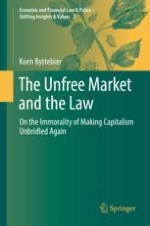2018 | OriginalPaper | Buchkapitel
3. On Certain Less Obvious (Neo-)liberal Principles Shaping Capitalism
verfasst von : Koen Byttebier
Erschienen in: The Unfree Market and the Law
Aktivieren Sie unsere intelligente Suche, um passende Fachinhalte oder Patente zu finden.
Wählen Sie Textabschnitte aus um mit Künstlicher Intelligenz passenden Patente zu finden. powered by
Markieren Sie Textabschnitte, um KI-gestützt weitere passende Inhalte zu finden. powered by
